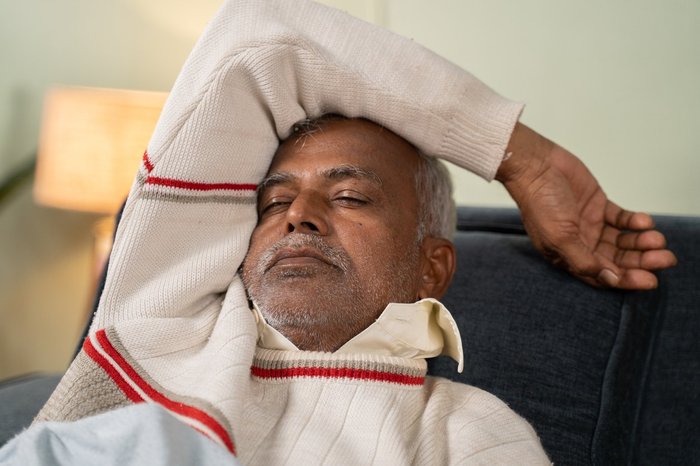People with chronic kidney disease (CKD) often report feeling very tired. Your doctors may describe this symptom as fatigue.
The following information explains fatigue in kidney patients. If you have any further questions or concerns, please speak to your doctor or nurse.
What is fatigue and why do I have it?
Everyone feels tired occasionally. Extreme, ongoing tiredness, together with a lack of energy, is often called fatigue. If your kidneys are not working well, toxins (waste products) build up in your blood and this can make you feel tired and weak. You may feel more tired as your CKD progresses.
- Kidney damage can also lead to a shortage of red blood cells, causing you to be anaemic. If anaemia is not treated, it can result in you feeling more tired than usual and lacking in energy.
- If you are receiving haemodialysis you may find that you feel very tired after the treatment. People describe this as feeling ‘washed out’ or ‘drained’. This can last for a few hours after each session or much longer. This feeling may improve over time as your body gets used to the dialysis.
- Poor sleep quality can also cause fatigue, particularly if you have problems falling or staying asleep or if you sleep during the day.
- Itching is common in people with kidney disease and can also cause disturbed sleep.
- A small number of people suffer from a condition called sleep apnoea, when your breathing stops and starts while you sleep.
- Some kidney patients complain of restless legs syndrome. This is a feeling that your legs need to keep moving. It often occurs when lying in bed at night and can prevent people from sleeping well.
- Feeling depressed or anxious can also cause sleeplessness and fatigue. For example, you may be having so many anxious or worrying thoughts that they keep you awake at night, so you are tired during the day.
What are the symptoms of fatigue?
Fatigue can affect people in different ways. Some of the common symptoms are:
- Feeling very tired most days
- Feeling that you lack the energy to carry out daily tasks such as getting washed and dressed
- Finding it hard to concentrate
- Feeling anxious, sad or low in mood
- Losing interest in things you usually enjoy
- Poor memory
Do I need any tests to confirm fatigue?
It’s important to tell your healthcare team if you are experiencing symptoms of fatigue so that they can do some simple blood tests to exclude any treatable causes such as anaemia. If you are receiving dialysis, blood test results can show if you are getting enough dialysis, as being ‘under dialysed’ can result in extreme tiredness.
If your kidney team thinks you might have sleep apnoea, they may refer you to a specialist sleep clinic for tests. Restless legs syndrome is usually diagnosed by your doctor carrying out a clinical examination and asking a series of questions.

What treatments are available?
- If your fatigue is caused by anaemia, this can be treated by medications such as erythropoietin (EPO) or iron supplements.
- If blood tests show that you are ‘under dialysed’ you may need to receive more dialysis, as more frequent and/or longer sessions can help with fatigue.
- Sleep apnoea can be treated by using a device at night to improve your breathing.
For many people with kidney disease, there is no obvious cause for fatigue so the condition cannot be easily treated, but it can be managed by making some small changes to your lifestyle to improve the symptoms.
What can I do to manage my exhaustion?
- If you are prescribed medications to treat anaemia, make sure you take them as instructed.
- If you are receiving dialysis, make sure you complete your prescribed dialysis hours.
- Watch your fluid intake between dialysis sessions as needing too much fluid taken off during dialysis can make you feel tired and washed out.
- Rest after haemodialysis. When you get home, rest for an hour or two until you feel less tired – this is sometimes referred to as ‘dialysis recovery time’ – but try not to fall asleep.
- Talk to your healthcare team about possible treatments for itching if this is causing you difficulty.
- If you are feeling depressed or anxious, ask your healthcare team if you can be referred to a counsellor or psychologist who may help you to manage these feelings.
- Ask your healthcare team if there is a local exercise programme for kidney patients. A gentle exercise programme can be relaxing and may help to improve your sleep.
- Plan your week so that activities are spread out rather than trying to do too much in one day. Have plenty of rest periods throughout the day but try not to fall asleep.

Try to improve the quality of your sleep:
- Try not to sleep during the day. However, if you find that a short nap helps, limit it to half an hour.
- Avoid drinks containing caffeine late in the day.
- Go to bed at the same time every night and wake up at the same time each morning.
- Relax before bedtime.
- Make sure you have a comfortable bed and a dark, quiet, cool bedroom.
- Avoid watching TV and using electronic devices an hour before bed.
Fatigue (tiredness): download or order Kidney Care UK's information leaflet
You can download our Fatigue (tiredness) leaflet for free.
You can also order a printed copy of Kidney Care UK’s Fatigue (tiredness) leaflet to be sent to you in the post.